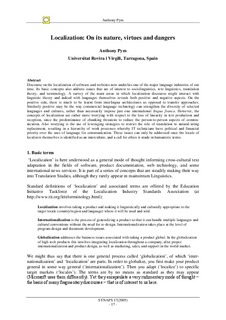Localization: On its nature, virtues and dangers
Journal article
Permanent lenke
http://hdl.handle.net/11250/2394909Utgivelsesdato
2005Metadata
Vis full innførselSamlinger
Originalversjon
SYNAPS - A Journal of Professional Communication 17(2005) pp.17-25Sammendrag
Discourse on the localization of software and websites now underlies one of the major language industries of our
time. Its basic concepts also address issues that are of interest to sociolinguistics, text linguistics, translation
theory, and terminology. A survey of the main areas in which localization discourse might interact with
linguistic theory and indeed with languages themselves reveals both positive and negative aspects. On the
positive side, there is much to be learnt from interlingua architectures as opposed to transfer approaches.
Similarly positive may be the way commercial language technology can strengthen the diversity of selected
languages and cultures, rather than necessarily impose just one international lingua franca. However, the
concepts of localization are rather more worrying with respect to the loss of linearity in text production and
reception, since the predominance of chunking threatens to reduce the person-to-person aspects of communication.
Also worrying is the use of leveraging strategies to restrict the role of translation to natural-string
replacement, resulting in a hierarchy of work processes whereby IT technicians have political and financial
priority over the uses of language for communication. These issues can only be addressed once the locale of
localizers themselves is identified as an interculture, and a call for ethics is made in humanistic terms.
